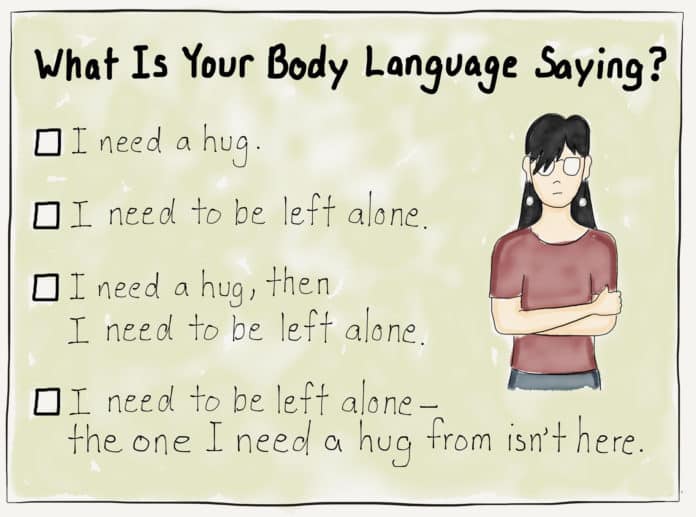
I am sure you have often noticed how some people talk so much with their hands. It is as if they are communicating in sign language – and the truth is that they are. Some nationalities like the Italians and Spanish definitely use their hands more in conversation, but in actual fact we all do it.
There is no language barrier when it comes to body-language and some researchers put the level of non-verbal conversation as high as 70 per cent of all communications.
It is not only the hands which tell a tale. Facial communication is the most important part of what you are telling someone, and is in fact four times more believable to the listener.
Body language – technically known as kinesics is a significant aspect of communications and relationships. Police interrogators are trained to read the signs of lying from the movements of hands, arms and face during criminal investigations.
Business seminars lecture on what to look at when interviewing a potential employee and in how to read a client or business customer – basically to pay more attention to what they see rather than what they hear.
Nonverbal language includes things like stance, gestures, facial expression and even smaller stuff that is barely perceptible like a brief shrug of the shoulder or nod of the head. In this instance, nonverbal is more than body language because it involves a study of aspects like a change of tone in the voice.

The body language most of us are conscious of is where the person opposite you folds the arms and maybe even crosses the legs at the same time. This posture is generally a clear signal of disinterest in you and you are being shut out. In a previous article, ‘The eyes have it’, I wrote that the eyes tell us everything if we know how to read them.
Looking someone in the eye generally indicates that you are direct and forthright; although some psychopaths have trained themselves to hold eye contact with their victim, because they do not possess a conscience. Evading eye contact may also indicate no more than you are shy and not necessarily deceptive; but is also used to show that a person is annoyed or disgusted at what they just heard.
Everyone is now aware of the significance of the firm handshake, to the extent that there should be a government health warning attached to wearing a ring when you shake hands with some fellows, with their determination and enthusiasm to demonstrate sincerity!
Those who can read these things are now looking at how you turn your head, shrug your shoulders, or touch your face with your hand in order to read what you are really thinking. My late brother had a great saying when he was mayor of Thompson, Manitoba; ‘don’t tell me – show me’.
Never look at your watch or the clock on the wall during a meeting – unless of course the outcome means less to you than it does to the other guy! Body language will send messages as to the state of mind of a person such as aggression, (no, it doesn’t have to be as clear cut as a belt in the mouth!) attentiveness, boredom, pleasure, amusement and so on – and as your mammy always told you, ‘don’t fidget’!
What we see here is that researchers are probably correct when they tell us that body language is 70 percent of our communications: And it is here that we come to the greatest dangers of the Internet and social networking. The essential ingredient of body language is missing. When you are posting a comment to or about someone, you are not looking into their eye.
When the cowardly misfit is posting an anonymous ‘comment’ full of bile and venom, he is not backing it with body language. He can post the cowardly lies he wouldn’t have the guts to say to your face and then skulk back off into his miserable existence. Even what otherwise might be harmless slagging on Facebook can become more hurtful for young people because of being bereft of body language and because the words then remain after the moment has passed.
I have a theory that social networking is more dangerous for Irish people because traditionally our bonds of friendship are cemented through good natured insults. Every opening, every weakness, every loss, every mistake is not ignored; but instead pounced upon, brought out in the open and dealt with through ‘ a bit of a slag’.
Young people are brought up on this way of dealing with life and become proficient while sharpening their wits in secondary school. But when these exchanges are transported onto Facebook, often with an eye to what others will think, and without the body language – it is a recipe for hurt.
Communicating without body language is not only dangerous for teenagers, but for all of us. I have had arguments via emails, where I went in far more forcefully and hurtful, because I was not privy to the body language of the other person. Another danger is that you can keep on and you are not being answered back or seeing the affects your words are having on the other person.
The white of an eye is never seen on either side. Words take on different meanings without body language or hearing a tone of voice. There are no colder words than a derogatory remark left on Facebook – or worse still; an insult posted by an anonymous loser on some blog or other.
So be aware of your own body language and that of those around you: And if you feel like giving someone a big genuine hug – well then do it because that is one of the nicest sentences in the language of the body.
Don’t Forget
Language is the dress of thought; every time you talk your mind is on parade.






